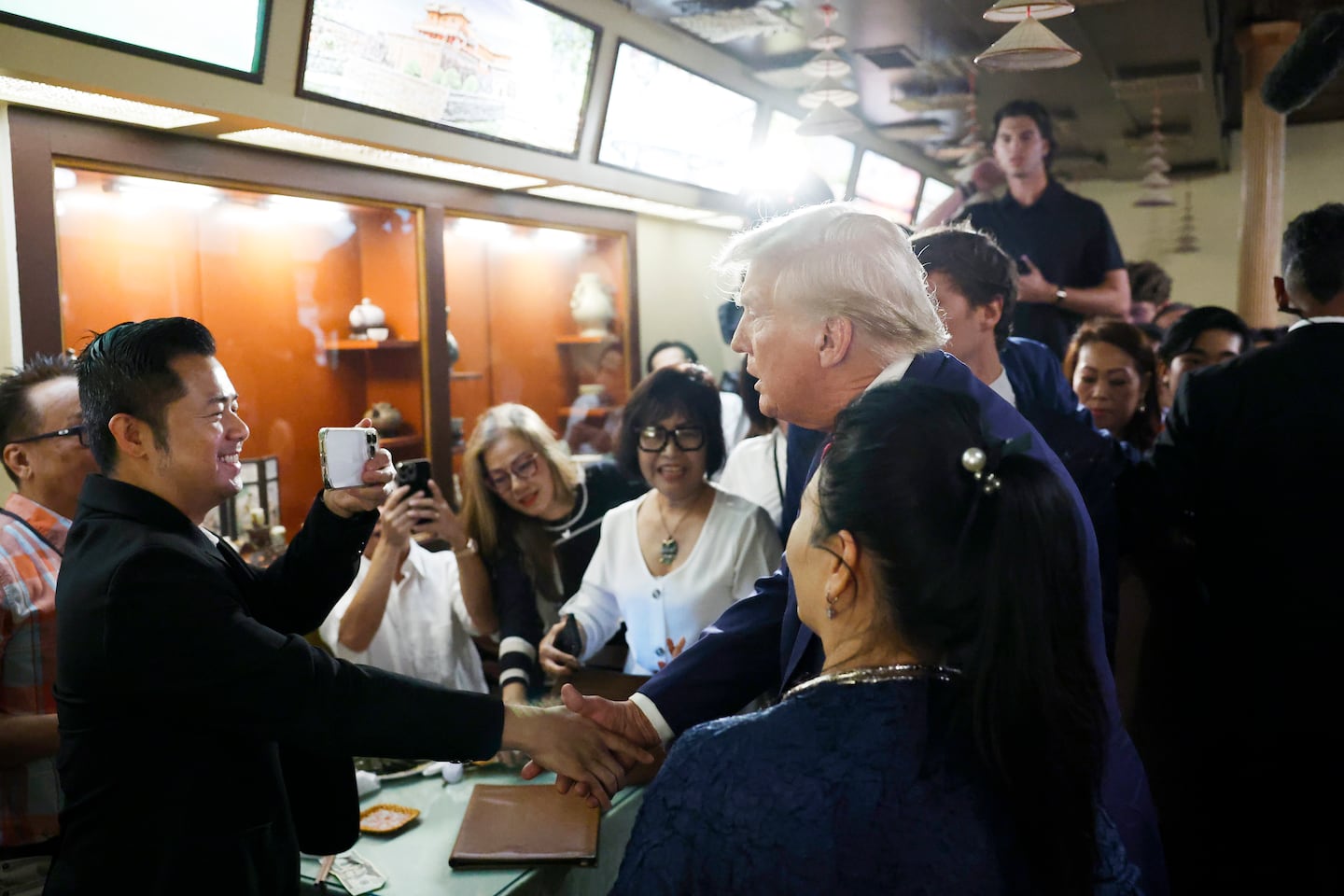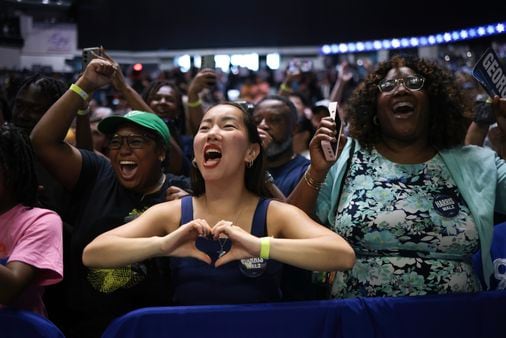“It’s hard to talk to them about presidential nominees, or about politics in general, because if they already have their mind set on something, it’s kind of set in stone,” said Lam, who grew up south of Atlanta in Clayton County. “A lot of the time, when I talk about injustices in our world, because it does not directly affect them, they don’t think that it matters.”
The divide in Lam’s family captures a challenge Harris faces in this topsy-turvy 2024 presidential election. In 2020, Asian American voters turned out in historic numbers and, in Georgia, helped President Biden become the first Democratic nominee to win the state in 28 years.
This cycle, Harris is getting tremendous support from South Asian Americans donating and volunteering in huge numbers, excited to support the first Indian American presidential nominee. But the broader Asian American electorate is far from a monolith, encompassing people with heritage from many distinct countries. And they have mixed responses to Harris’s candidacy — if they’re tuned in at all. In critical swing states such as Georgia, a Harris win could hinge on how many come out to vote for her.
“What we see on Zooms, or the people that we’re interacting with in our little politically engaged, progressive bubbles, definitely does not comprise the entirety of the Asian American universe,” said Phi Nguyen, a strategist for the AAPI Victory Fund, a Democrat-affiliated super PAC boosting AAPI voter turnout. “There’s a lot of conversations to be had to understand where Asian American voters actually are and the breadth of those experiences.”
Asian Americans and Pacific Islanders are the fastest growing racial and ethnic group nationwide and often support Democrats. Participation among those voters, who were mobilized by heightened pandemic-related discrimination, skyrocketed in 2020: In Georgia, it went up by more than 80 percent. AAPI turnout exceeded the presidential margins of victory, in states including Arizona, Pennsylvania, and Nevada — increases analysts say likely helped Democrats.
With polls showing Harris and Trump neck-and-neck, AAPI voters appear to again have the numbers to decide close races in must-win states: In Georgia, which Biden won by fewer than 12,000 votes, there are now nearly 330,000 eligible AAPI voters.
Momentum has been particularly strong among South Asian supporters, who gave nearly $2.4 million to Harris’s campaign within 10 days of launching her bid, an analysis from the Los Angeles Times found.
“It has been nonstop — we were having a hard time keeping up,” Harini Krishnan, national director for South Asians for Harris, said after organizing volunteers to door-knock for a local Indian American candidate in Georgia. The day before, she organized around 70 volunteers to launch canvassing for Harris in Pennsylvania.
Democrats are trying to connect with other Asian Americans by relaying Harris’s background as a child of immigrants, in Zoom calls like “Hmong Americans for Harris,” and battleground state events. That message resonated with Jennifer Lee, a stay-at-home mom from Atlanta, who, at a recent “Harris-Walz Dim Sum Rally/Canvass,” said Harris was the first candidate she was inspired to get involved for.
“Kamala Harris is a candidate I’m excited about because she’s young and a woman and Asian American,” said Lee, 41. ”The fact that she grew up with immigrant parents … many people here can identify with that.”
But Lee and others said they were concerned the enthusiasm evident at the 400-plus person rally might not translate beyond committed Democrats, particularly to older, first-generation voters, who may not feel a personal connection with Harris or have concerns about the Biden administration’s handling of issues such as the economy and immigration.
Reaching those voters is complicated. Outreach materials often need to be translated into numerous languages. In the past, many voters weren’t contacted by either party.
“Even though we refer to them with an umbrella term, within the Asian community, people don’t necessarily view themselves in the same group,” said Michelle Au, a Georgia state representative. “It takes people who live in and understand the communities to do the kind of granular, surgical-level outreach that you need.”
Not all communities are inclined to support Democrats. Vietnamese Americans, who tend to lean Republican, backed Trump in larger numbers than other groups, which Vietnamese politicians attributed to Trump’s calls to lower taxes, opposition to China, and harangues against “communism” — a label Trump regularly slaps on Harris.
Last month, Trump visited a Vietnamese restaurant in Virginia where he declared “the Vietnamese community loves me, and I love them.” Tim Le, a Republican Vietnamese American running for a county seat in Georgia, said voters in his community “can relate to him.”
“We escaped from communism in Vietnam, and we prefer smaller government, we prefer our freedom to do well as far as economic means and freedom of religion,” he explained.
Still, the former president alienated voters with anti-Asian rhetoric, such as when he called COVID-19 the “China virus” as anti-Asian violence spiked in the pandemic’s wake. AAPI voters often align with Democrats on issues including gun control and abortion policy.

“Even if there is frustration with the Biden-Harris administration among Asian Americans, Trump has hit a ceiling in terms of how much additional support he could gain because of his statements and policy proclamations involving race and immigration,” said Karthick Ramakrishnan, the founder of AAPI Data, a research organization focusing on these voters.
Huihua Gao, 62, is one voter who said he’s backing Harris because of Trump’s attempts to overturn the 2020 election results, saying, “Trump is trying to destroy our democracy.”
But he said some friends, and even his wife, may support the former president: “When we talk, they say they have bigger concerns about illegal immigrants and the transgender, LGBTQ” issues.
Some anti-Trump voters unhappy with Democrats’ positions are considering not supporting either candidate. Chowdary Dhanala, an Indian American stock trader, supported Hillary Clinton in 2016 and Biden in 2020. Approached by Harris canvassers recently, Dhanala said he wasn’t sure he would support either candidate, pointing to what he described as “out of control” national debt.
“The path that we are taking as a country, guided by our politicians in D.C., is troublesome,” he told a reporter afterward. “I didn’t get here overnight, it took some time. … I thought, let’s give [Democrats] more latitude, they’ll fix these things. But they’re not.”
Republicans in Georgia and beyond have sought to capitalize on that dissatisfaction, building on outreach from the 2022 midterms. In Gwinnett County, a region with a large AAPI population outside Atlanta that powered Democrats’ wins in 2020, party leaders have attended Asian American events. Volunteers with the local GOP chapter wrote postcards advertising Republicans to voters with Chinese or Taiwanese last names.
But Sing-Lu Byers, a 52-year-old Taiwanese American who stopped by a Trump sign-waving event there, questioned whether the former president would win over AAPI voters.
“He’s got it, hands down, on his record. It’s just his personality nobody likes, and the way he is such an attack dog,” Byers said of Trump, who she supports. “Focus on the issues.”
Her daughter, who turns 18 this year, plans to cast an absentee ballot for Harris in Georgia from her Illinois college.
That sort of intra-family disconnect is one Democrats hope to take advantage of by rallying young people, who are more liberal-leaning than older generations.
Actor BD Wong, a Harris campaign surrogate, called Asian American voters a “tricky demographic,” because of “a fiscal conservatism that keeps people really being able to think outside of one issue.” Younger Asian Americans, he said, balk at that thinking, adding that Democrats “need to get our energy and our word out through that youthful spirit.”
Long Tran, a Democratic state representative, was motivated to run for office by the shootings at spas in Atlanta in 2021, in which a gunman killed six women of Asian descent. He is now working to change Republican leanings among Vietnamese Americans in part by combating apathy among young people.
Building Democratic support, he said, will involve outreach from elected leaders like him in cities like Morrow in Clayton County, where nearly one-third of residents are Asian. That city’s two Vietnamese–American council members are Republicans.
“We are, in a sense, a role model for these communities,” he said. “If we can continue to build their trust in us, then hopefully we can build their trust to vote for a Democratic ticket up and down the ballot.”
Anjali Huynh can be reached at anjali.huynh@globe.com.

